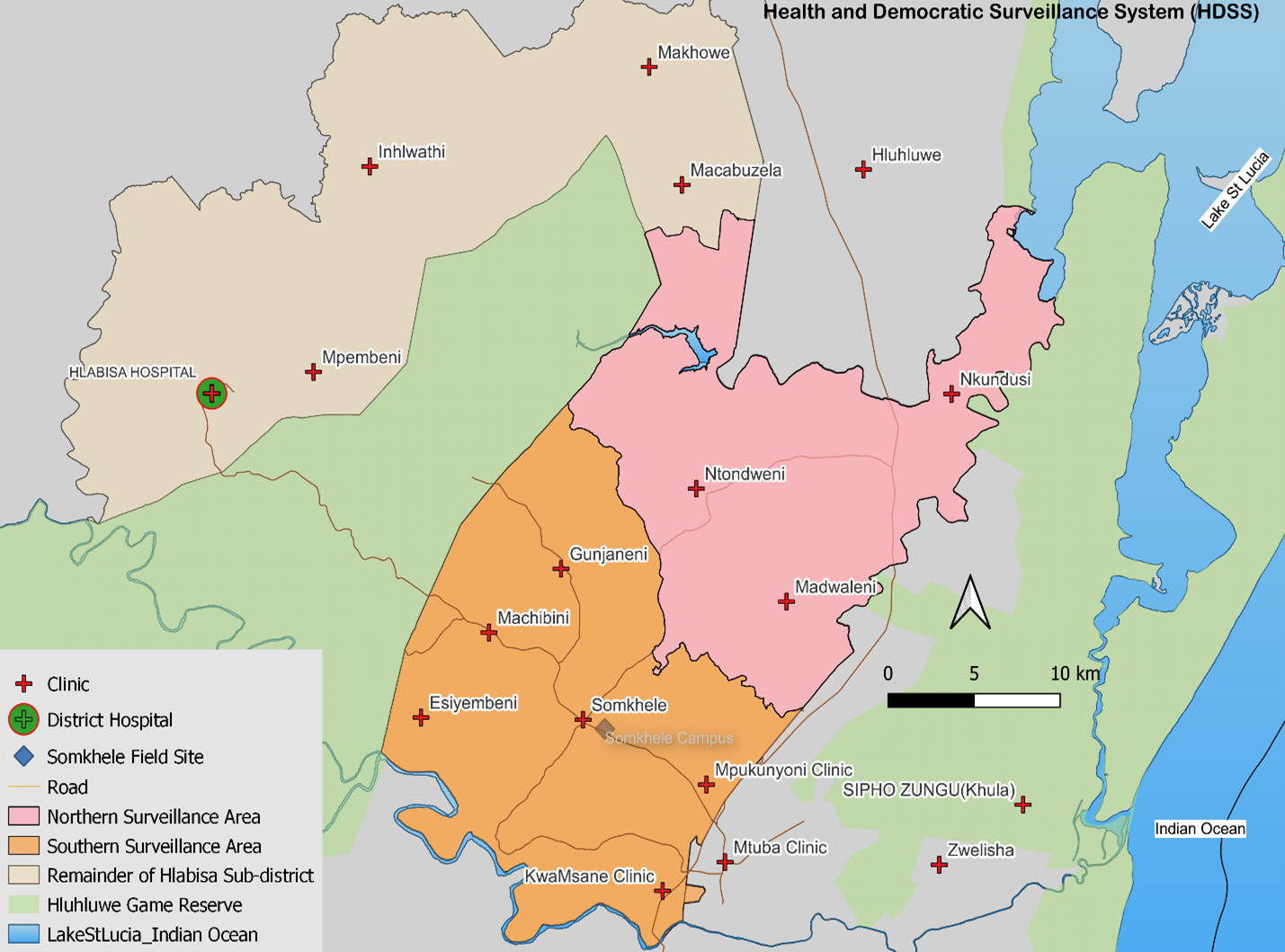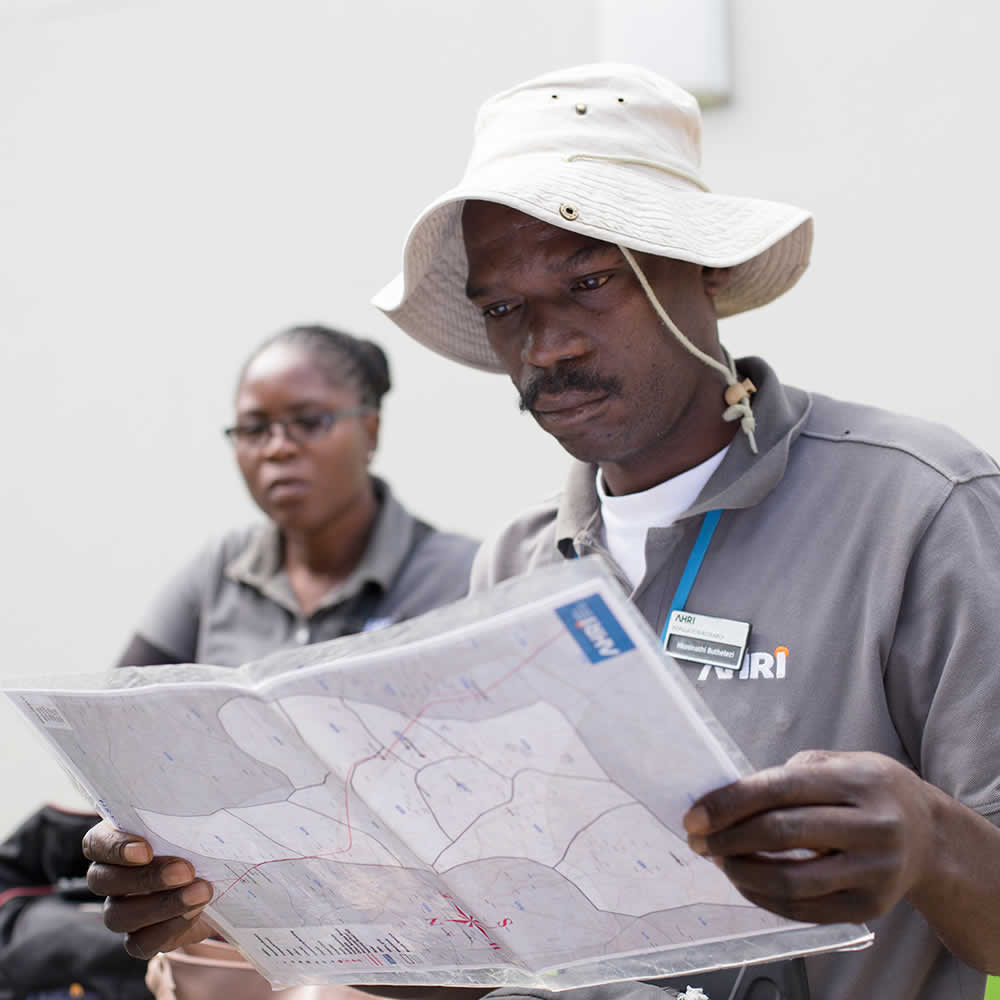The institute has two campuses: AHRI-Somkhele is in an under-resourced rural area of northern KZN. AHRI-Durban is based at the University of KwaZulu-Natal’s Nelson R. Mandela School of Medicine. At AHRI-Somkhele’s core is a health and demographic surveillance site, which aims to describe the demographic, social, and health impact of the HIV epidemic in a population going through a health transition, and to monitor the impact of intervention strategies on the epidemic. The institute’s basic and translational science programme is supported by superb laboratory infrastructure at AHRI-Durban. The labs incorporate over 600m² of biosafety level 3 (BSL-3) space, and a South African National Accreditation System/ISO 15189 accredited clinical laboratory.
The Health and Demographic Surveillance Systems has the following objectives:
- To obtain accurate data on population dynamics (births, deaths, and migrations) to enable the attribution of exposure to infection risk and intervention measures.
- To obtain accurate measures of disease burden, including incident HIV infection, cause specific mortality, and morbidity through direct measurement and linkage to health records.
- To obtain accurate measures of individual and population level access to services, including health, social welfare, educational and municipal (utilities such as water, sanitation, and electricity) services, either directly through interviews or indirectly through record linkage.
- To measure clinical phenotypes and manifestations of ill health longitudinally and accurately in a rural population.
- To provide population level evidence of service or research intervention impact.
- To provide a sample frame for population-based studies, obtain consent to contact participants based on their population health data for enrolment in specific research studies, to locate and follow-up study participants enrolled in longitudinal and intervention studies, and to obtain biological samples from individuals based on measured information.
- To communicate diagnostic and risk information gleaned from the activities above to participants when appropriate and facilitate linkage to clinical care where required.
The eligible population are members of households’ resident within the programme area. The boundary of the programme area is shown below and comprises the areas indicated as the household surveillance and Treatment as Prevention intervention areas on the map.
The HDSS have the following components:
- Household component consisting of one in-person interview with a household informant and two telephonic interviews per year.
- Individual component conducted during one visit (coinciding with the visit to the household they are a resident member of) per year.
- A verbal autopsy interview with the care giver or close relative of all individuals who have died.
- Recording of all hospital admissions and discharges at the Hlabisa district hospital.
- Linkage of individuals in the programme area to individual level service delivery data obtained from public health, welfare, home affairs and education authorities; and
- Registering attendance at the - eleven primary health care clinics serving the programme area (Esiyembeni, Gunjaneni, Hluhluwe, KwaMsane, Machibini, Madwaleni, Mpukunyoni, Mtubatuba, Nkundusi, Ntondweni, and Somkhele).
AHRI conducts its research across four research departments:
- The population science department provides essential information on population dynamics, burden of disease measures, and hosts studies aimed at population or community-level intervention.
- The clinical science department manages interaction with the health service delivery system, health care providers and patients and hosts clinical intervention and cohort studies.
- The laboratory research department provides support and innovation to discovery-focused and laboratory-based investigators as well as more routine high throughput diagnostic assays and an evaluation platform which can be used by laboratory investigators, as well as for studies conducted by the population and/or clinical research departments.
- The research data management department integrates data from the research department specific data sources by extracting, transforming, documenting, and loading datasets for statistical analysis onto a shared data repository. The data repository provides an archival record of all datasets (including publication datasets) and facilitates secondary data analysis by both intra- end extra-Institutional data users.
The purpose of the four research departments is to provide an efficient and integrated environment to maximise research productivity. The research departments organise and manage people with the requisite skills to support the research, implement optimal and accredited (where required) standard operating procedures, operate shared equipment, and provide integrated research data management. The research departments will evolve over time and be responsive to the research agenda.

AHRI’s research
AHRI’s research is organised into four divisions - population, basic and translational, social, and clinical sciences - and around four intersecting scientific content areas: HIV, TB, emergent or re-emergent infection, and adolescent mental health. AHRI’s 28 faculty members have the freedom to pursue their own research agendas within the institute’s broader strategy.
AHRI’s HIV research strategy is focussed on prevention, with discovery of biological and social drivers of transmission, and translation of findings into interventions; surveillance, to discover critical trends in the HIV epidemic and understand the longer-term impact of health policy and interventions; and understanding the HIV reservoir, or HIV persistence, in adults and children, followed by testing of tailored interventions in clinical trials.
TB research at AHRI is organised around four components: TB pathogenesis through examining excised human lung, accessed via long-term collaborations with local hospitals; surveillance for TB via our HDSS, with the aim to understand transmission on a population basis; understanding, diagnosing, and intervening in subclinical, or asymptomatic TB disease; and finally, targeted clinical trials of novel TB drugs and vaccines.
AHRI’s emergent or re-emergent infection research area uses the institute’s SARS-CoV-2/Covid-19 strategy as a model to rapidly mobilise our population and laboratory infrastructure to understand short- and long-term consequences of an emergent or re-emergent infection, particularly within the context of HIV immune dysfunction and prevalent TB. It additionally harnesses world-leading, South Africa-driven collaborative structures, AHRI’s clinical trials unit and HDSS infrastructure to conduct clinical trials of novel drugs and vaccines.
AHRI’s adolescent mental health research area builds on the institute’s current studies of depression in pregnancy, and on well-established implementation research programmes in adolescent health. AHRI is uniquely placed to explore adverse childhood events, prolonged exposure to violence and economic hardship, as well as the effect of parenting and social protection in childhood against poor mental health outcome.
Multiple scientific platforms and core business structures support AHRI’s research endeavours, including a data science unit, and a clinical trials unit. AHRI’s public and community engagement model encourages research participants to be active partners in the development of a research agenda that is meaningful and directly relevant to their lives.
Academic programme
AHRI offers an academic training programme that facilitates skills development and career progression for masters and PhD students, and postdoctoral and clinical fellows. The institute’s leadership development training offers modules including biostatistics, scientific citizenship, academic writing, and training in core skills such as setting up collaborations, project and time management, and strategic career planning. Travel awards are also made available to support additional training needs. AHRI’s flagship programme, the sub-Saharan African Network for TB/HIV Research Excellence (SANTHE), focuses on African and global collaborations to enhance research and capacity building in HIV, TB, and associated comorbidities.
Funders
A Wellcome Trust Africa and Asia Programme core grant provides ~30% of AHRI’s total budget, with the remaining funding generated through individual investigator-initiated grants. Major funders include the National Institutes of Health, Bill & Melinda Gates Foundation, Medical Research Council (UK), among others.
Contact AHRI
African Research Institute (ahri.org)
Get in touch via info@ahri.org



